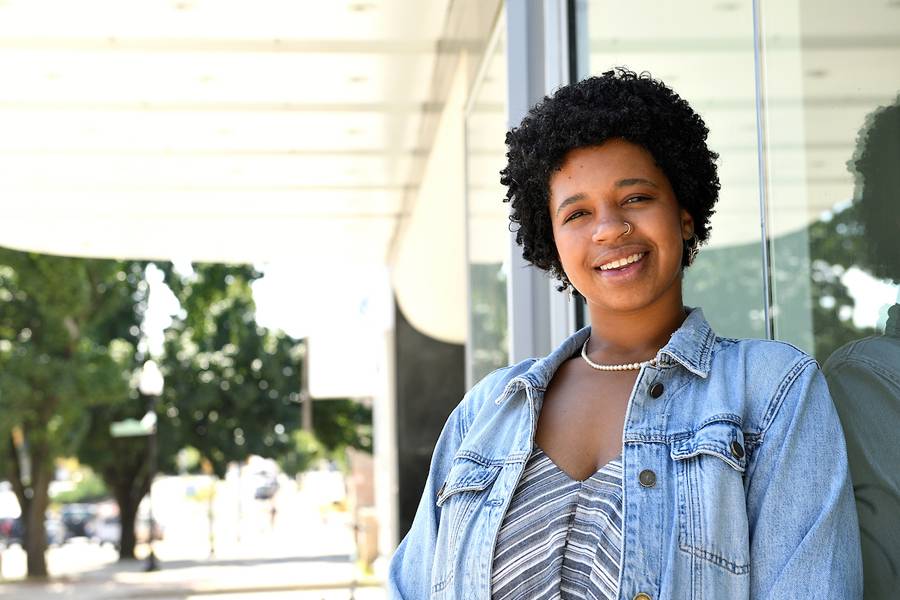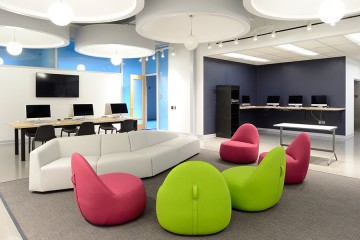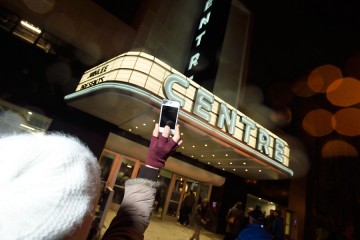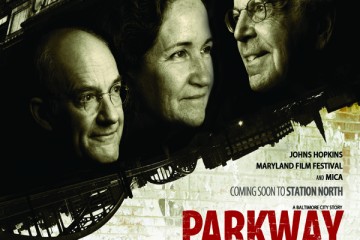It's easy to assume that Logan Lyons is the cruise director of the JHU-MICA Film Centre. She's the first person you see when you enter the state-of-the-art film and media production facility in the Station North Arts and Entertainment District, the first person you might ask for directions to one of the screening rooms, the equipment cage, a faculty member's office, or simply the nearest place to grab a cup of coffee.
As the administrative coordinator of the JHU-MICA Film Centre, Lyons sits at the intersection of two institutions—with their two sets of faculty and undergraduate and graduate students—and she's become the campus's all-purpose player, handling a wide variety of questions or tasks that may arise.
What does the administrative coordinator of the JHU-MICA Film Centre do?
I take care of mostly financial responsibilities—preparing travel and payment for visiting artists, budget reconciliation, and assisting in any way amongst the four programs housed in the Film Centre. I also do a lot of events planning with Melissa Capello, the academic program administrator. Those are technically my responsibilities, but because of my location right as people enter, I do find myself taking care of classroom support, introducing visiting artists to faculty when they arrive, marketing for events, coordinating with the Parkway, coordinating with MICA, coordinating with Hopkins. And because I'm young, I've become a liaison between the faculty and the other staff and students.
You've been down here in Station North since the Film Centre opened. How has it been? This is a campus, but it's a campus a bit removed from both institutions that are collaborating here.
I started working at the Film Centre during the second year of its opening. It's hard when it comes to understanding how both schools work because they're very different. They have different billing requirements. The way they handle paperwork is different. And we get students from both campuses, and they're different students. I feel like Melissa and I both do a lot of adjusting to each institution's needs, and we want to find a Film Centre norm and make that more consistent for the students and faculty here.
That's a goal of ours, to make a Film Centre experience, not one thing for MICA students and another thing for Hopkins students, or one thing for undergrads and a different experience for grad students. We want everyone to feel equal when they walk in here. So we make sure IDs from both campuses work to key in, and make sure everybody knows where the bathrooms are.
A lot of our day, along with our staff, goes to making sure the Film Centre runs well. We are at a disadvantage due to our location because our requests for additional services such as repairs or maintenance are considered "off campus." Many needs that would be addressed by particular departments at the respective schools fall on our staff to fix.
And that's important, because while this campus is a bit removed from the main campuses, it's also serving students and faculty who have a different and unique set of needs for their work and study.
We're a hub for media—I feel like that's what we do. It's not just film. Yes, we have shooting stages, sound and video editing suites, the cage to get the equipment, but we also have students who want to design graphics for films; we have a lot of still photographers for film. And we're still pretty new. We opened in 2015, and we're still figuring out how students want to use everything here. We have a sound stage that has a green screen, which visitors get really excited to see. We have a screening room that seats 49 people, and students are able to see their work on a big screen right in this space. We have a state-of-the-art recording studio, which students can really take advantage of.
Our facilities are open really late—from 7 a.m. until 2 a.m., and during finals periods, they're open 24 hours. Students are basically living in here while working on their projects. They're doing casting calls in the classrooms, they're editing, and Todd [Evans], our newest staff member, has been updating the editing suites to make them specialized, so some might be geared more for color correction while others are better suited for post-production sound. Travis [Levasseur], who manages the cage, listens to the students and tries to make sure they always have what they want. As a MICA alum, he works hard to provide equipment and workshops for our students to make sure they're prepared post-graduation.
As this is a hub for student media production, how is it being down here in the part of the city ostensibly focused on arts and entertainment?
It has its pros and its cons. I think we're here a little early, just for the fact it is still a food desert. In the last few months we have lost several establishments—BAMF Café, Red Emma's, and the café [at the] Motor House have all closed. GrubHub is definitely our best friend. It can be challenging trying to get food here—and for students on the meal plan, each campus is 15 minutes away, by foot or shuttle, so if you only have a half hour or 45 minutes between classes, you're skipping a meal.
But having the Charles and the Parkway a block away? That's great. We're about a five-minute walk from Penn Station, which is great for visiting artists, and we're in a central location of Baltimore overall, but there is a lot of community rebuilding to be done. As far as the arts are concerned, I believe there are efforts working on establishing open venues for artists. The more businesses that come and stay here, the people will follow.
What's your average day like?
There is no average work day at the Film Centre. There's always work to be done: an event to be planned or set up. My emails are likely to be swamped with requests like ordering food for a class or paying and preparing a visit of an artist.
What's your favorite part of the job?
I love my co-workers. I'm not sure if many people can say that, but I'm fortunate to have a supportive boss and co-workers that genuinely care about me. It's great to be able to come to work, which is only five minutes away, knowing that I'm working with great people and creative students eager to learn. The Film Centre is a unique environment, which offers me access to two institutions, and although difficult at times, it's rewarding to solve the issues for which we've been tasked.
How has the Film Centre turned out as a place to hold screenings and events?
Pretty good. For events planned ahead of time or mandatory for a class, we get a really good student turnout. During the Maryland Film Festival, a lot of us were able to make it over to the Parkway for events. A lot of our students even work and volunteer at the festival, so the reality of creating this community amongst establishments is important. This semester we planned to do an outdoor screening at the Y Not lot with food trucks, but due to the weather we had to host it indoors. We still had a great turnout, and even students from the Baltimore School for the Arts were able to attend.
I can't tell you the number of times I've been outside and somebody walks by and asks, What is this place? What do you have going on in there? In the future, we'd like to do more events where we engage with people, each other, and movies. We need more of that. The students are always so busy shooting and working on their projects, collaborating on each other's work, and it'd be nice if, every once in a while, they just get to hang out with each other, the faculty, and visiting artists.
Do you have any favorite films you've seen while working here?
I personally don't like to pick favorites. One of my greatest joys of working here at the Film Centre is watching students working on a project and finally seeing the end result. It's satisfying that they're offered the opportunity to have so much access to equipment, watching them facilitate their own auditions, and working long hours to edit their work together. They work to collaborate bi-institutionally, and between the undergrad and graduate programs. It's rewarding to see their hard work come to fruition.
How can people find out about events at the Film Centre or that it's sponsoring?
We have created a website that is informative regarding our resources and events. This semester Linda DeLibero and Laura Mason have been hosting Monday night screenings of the films of 1968 at the Parkway for their classes, which are open to the JHU-MICA community for free. Each semester opens up a new opportunity to be involved in film. There are always end-of-semester screenings hosted by [Johns Hopkins'] Film and Media Studies to display student work from the semester, and MICA MFA hosts a screening of senior thesis projects in May.
How did you end up working at the Film Centre? Are you a film fan, or otherwise involved in the arts?
I ended up working at the Film Centre in attempts of blending my administrative skills with the art realm. As a dancer and choreographer, I wanted another way to connect with the arts in Baltimore. I figured that through the location and institution I would be working for that it'd be a great place to be. Yes, I am a film and TV fan! I love watching shows and am constantly engaging in conversations with everyone here about them. It has been quite the fun to attend screenings and have open dialogue with other staff and faculty about what we're watching. I like to think I find myself watching more media than the students do.
Posted in News+Info
Tagged who does that?













